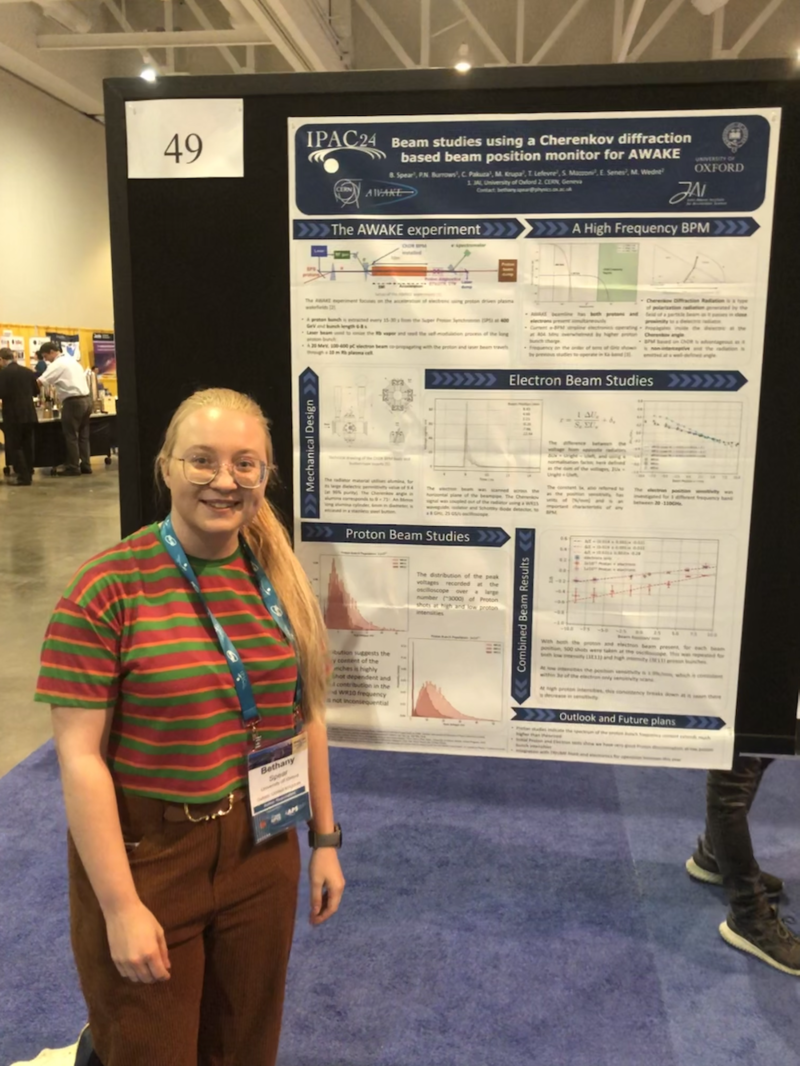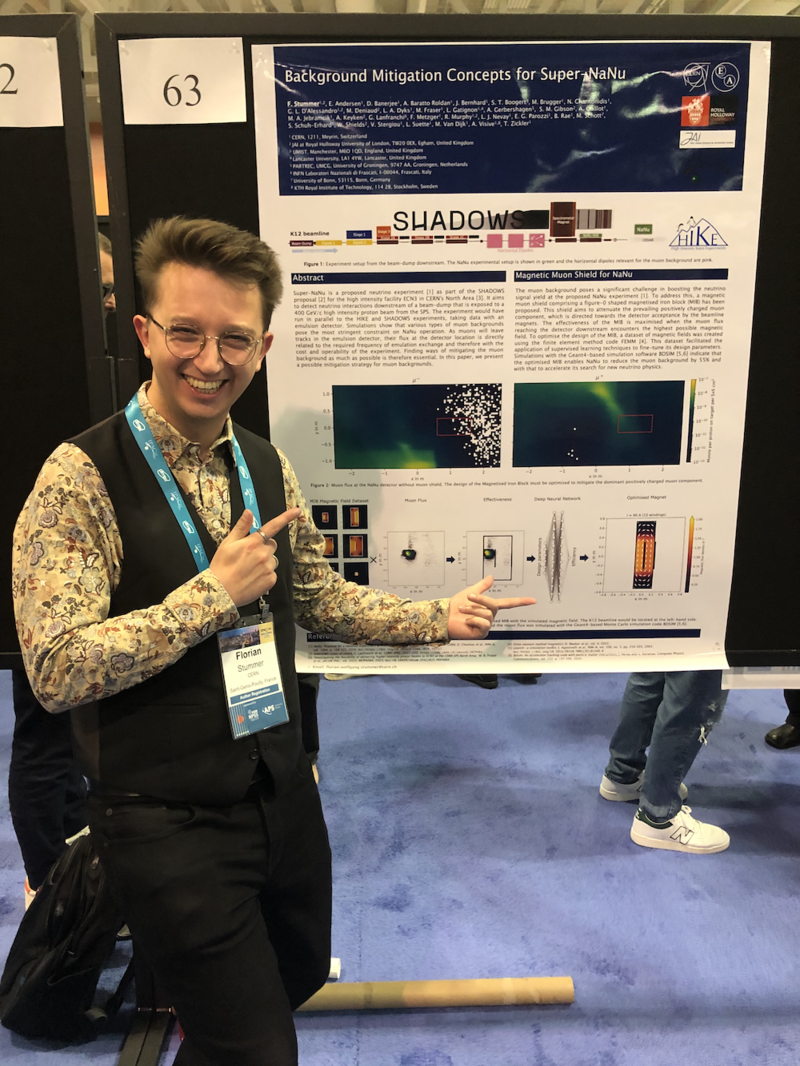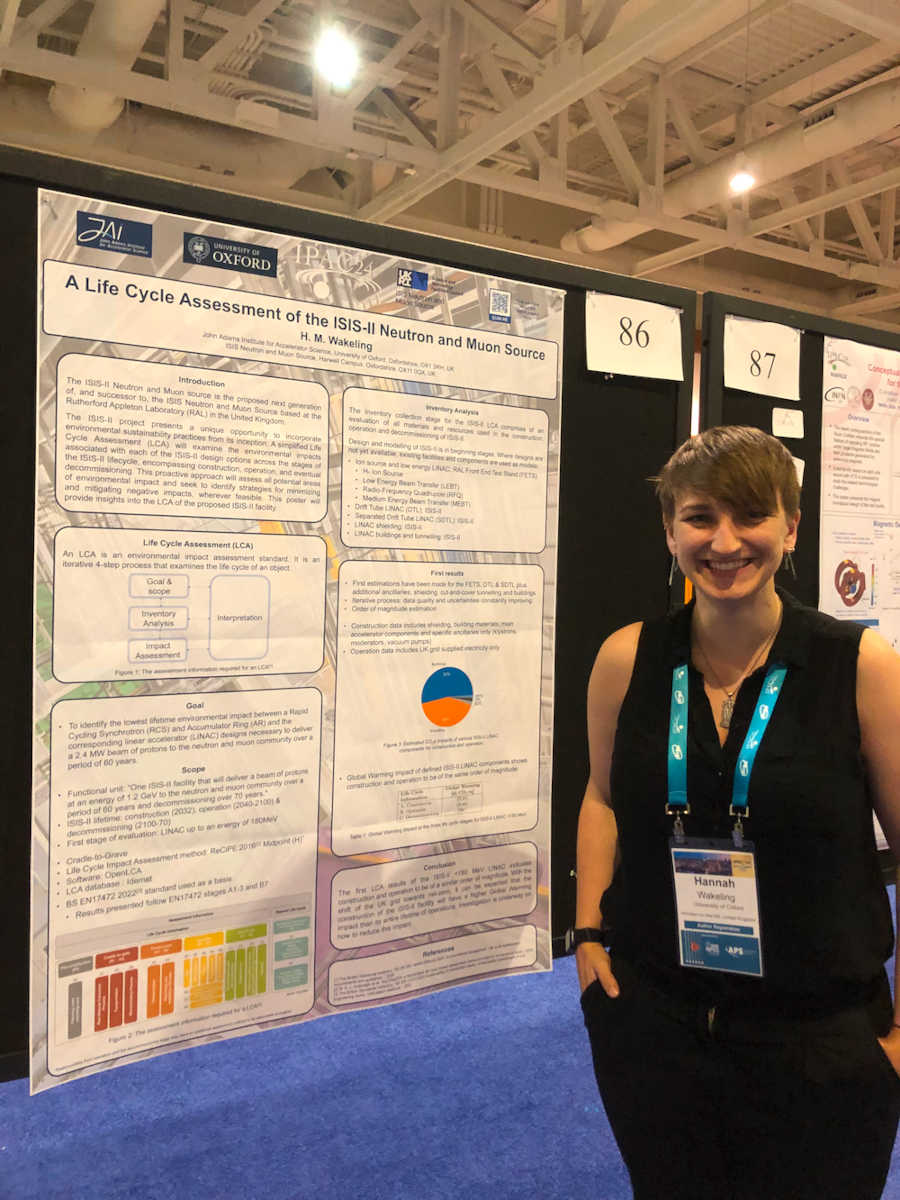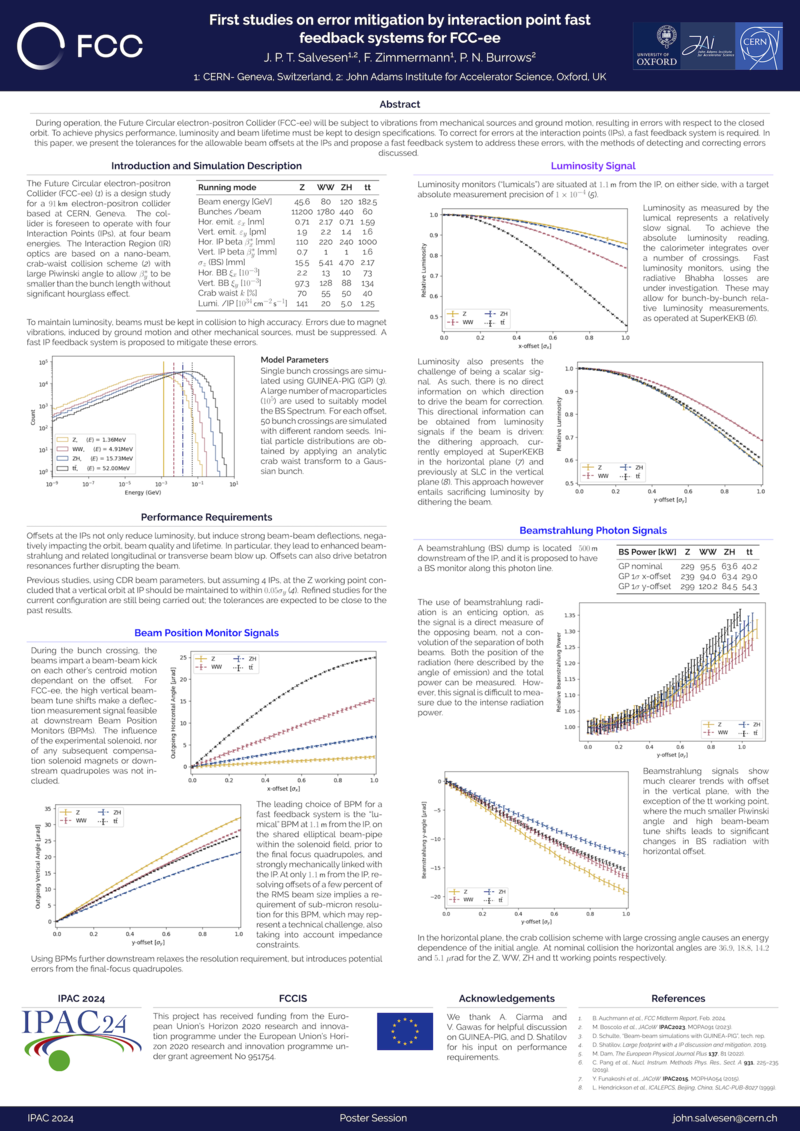Members of the JAI present their work at IPAC24
Comments from Bethany Spear, a 3rd year DPhil at the JAI
A Memorable Experience at IPAC24
This May, I had the opportunity to attend the International Particle Accelerator Conference (IPAC24) in the vibrant city of Nashville, Tennessee. The conference was held at the Music City Center, a venue that perfectly showcased the city's unique blend of tradition and innovation. As a DPhil student in beam instrumentation, I was eager to present my latest results on a Cherenkov-based Beam Position Monitor and to network with experts in the field.
The first day of the conference was specifically geared towards the student contingent of accelerator physicists. It allowed us to share our research with peers at the same career level and to attend sessions aimed at developing early career research skills.
The invited and contributed talks spanned a wide range of topics within the field, allowing all participants to step out of their specializations and engage in research from around the world. It was particularly interesting to hear from our American colleagues about the cutting-edge technologies being developed at their national labs, as well as the equally exciting Electron-Ion Collider project, for which the conference hosted the first-ever collaboration meeting. For an early career researcher, being included in discussions about projects that could shape our future career paths is especially important.
During the poster sessions, I had the chance to discuss my research in more detail with peers and experts alike. Particularly memorable were the interactions I had with industry partners who were also present. These interactions illustrated the value of research and development in a commercial setting and highlighted potential opportunities for me outside of the academic field.
Outside the conference, Nashville offered a delightful mix of culture and cuisine. Most evenings, we ventured to Broadway, the heart of Nashville's music scene. We enjoyed live performances at iconic honky-tonk bars, where the lively atmosphere provided a perfect backdrop for unwinding after a day of discussions and presentations. Sharing stories and experiences over a traditional Southern meal at a local restaurant further strengthened the camaraderie among attendees.
The conference concluded with a dinner, where I was able to reflect on the inspiring presentations and the new friends and connections I had made over the course of the week. Special appreciation should be given to the evening's entertainment, who managed to very patiently teach hundreds of accelerator physicists and engineers the Nashville tradition of line dancing!
In summary, IPAC24 was a remarkable experience that left a lasting impression on me. It combined the excitement of cutting-edge research with the charm of a city known for its rich musical heritage, making it an unforgettable chapter in my professional journey.
- Bethany Spear
Comments from Florian Stummer, a 3rd year DPhil at the JAI
This May I took a plane from Geneva all the way to the United States, where in Nashville, Tennessee this year’s IPAC was held. Many members of the JAI were present, and it was great to catch up with them on the latest accelerator news from the past year. Amidst the backdrop of country music, cowboy hats, and line dancing, we enjoyed the conference talks and seminars, and had the opportunity to present the latest status of our studies during the poster sessions.
In my work I focus on designing magnetic shielding to mitigate the muon backgrounds of fixed-target experiments in CERN’s North Area. In the piece presented at IPAC 2024 I explored the potential backgrounds of Super-NaNu, a proposed neutrino experiment that aims to search for new neutrino physics in an off-axis setup alongside the K12 beamline. Together with my team at CERN and collaborators from the experiment, we used machine learning techniques to develop a design for a magnetic shield that reduces the muon background in the off-axis detector region by 55%, enabling Super-NaNu to move closer to the beam axis and thereby increase its signal rate.
Attending IPAC was an enriching experience, providing an excellent platform to exchange ideas and insights with colleagues from around the world. The conference not only allowed us to have valuable professional discussions but also offered a unique cultural experience, blending scientific exchange with the vibrant local culture of Nashville. I returned inspired and with several new ideas to implement in our ongoing projects.
- Florian Stummer
Comments from Hannah Wakeling, a Postdoctoral Researcher at the JAI
This May, I attended IPAC24 in the dynamic city of Nashville, Tennessee. Renowned for its musical heritage and warm hospitality, Nashville offered an inspiring setting for a week of scientific exchange. Throughout the week I was captivated by the progress being made in various areas of particle accelerators, from novel accelerator designs to groundbreaking applications in industry and medicine.
Personally, one of the highlights of IPAC24 was the poster session, where I had the chance to engage with fellow researchers and discuss my work in detail. I had the opportunity to present my more recent results from evaluating the environmental impact of the proposed ISIS-II Neutron and Muon Source. As part of my work at the John Adams Institute and at STFC, I have been estimating the environmental impact of future particle accelerators and researching how to reduce it. I shared the preliminary findings that, from the main lifecycle stages of ISIS-II (construction, operation, decommissioning), construction of the facility will likely be the largest emitter of carbon dioxide. I then discussed that effective planning results in many opportunities to reduce that environmental impact. IPAC24 was also a fantastic opportunity to see the innovative research being conducted by peers from around the world, particularly in areas related to environmental sustainability in accelerator technology.
Reflecting on my time at IPAC24, I am grateful for the enriching experience that blended scientific exchange with professional development. The insights gained, connections made, and memories created will undoubtedly influence my work and inspire future innovations. I look forward to implementing new ideas and continuing the conversations started in Nashville as we advance towards reducing the environmental impact of particle accelerators.
- Hannah Wakeling
Comments from John Salvesen, a 2nd year DPhil at the JAI
Jack was unable to attend IPAC'24 this year due to his EAJADE secondment at KEK (Japan), but submitted the following poster, which was presented by his CERN supervisor, Frank Zimmermann.
As part of my DPhil studies into Interaction Point Fast Feedback Systems for FCC-ee, I recently submitted a poster and associated conference proceedings to IPAC, co-authored with my CERN and Oxford supervisors, Frank Zimmermann and Phil Burrows. The poster was presented by Frank Zimmermann.
Titled “First studies on error mitigation by interaction point fast feedback systems for FCC-ee”, the study focussed on potential input signals to a feedback system to maintain collision stability at the interaction points. Single bunch crossings at the different working points of FCC-ee were simulated using the Particle-In-Cell code GUINEA-PIG. The signals analysed were the beam-beam deflection, luminosity degradation and beamstrahlung light.
Despite the stringent requirements for such a system, promising results are shown, and this work continues to feed into discussions of the Machine Detector Interface design for the FCC-ee.
- John (Jack) Salvesen

Bethany Spear presenting her poster on "Beam studies using a Cherenkov diffraction based beam position monitor for AWAKE" at IPAC 2024

Florian Stummer presenting his poster on "Background Mitigation Concepts for Super-NaNu" at IPAC 2024

Hannah Wakeling presenting her poster on "A Life Cycle Assessment of the ISIS-II Neutron and Muon Source" at IPAC 2024

John (Jack) Salvesen's poster on "First studies on error mitigation by interaction point fast feedback systems for FCC-ee" presented at IPAC 2024.




